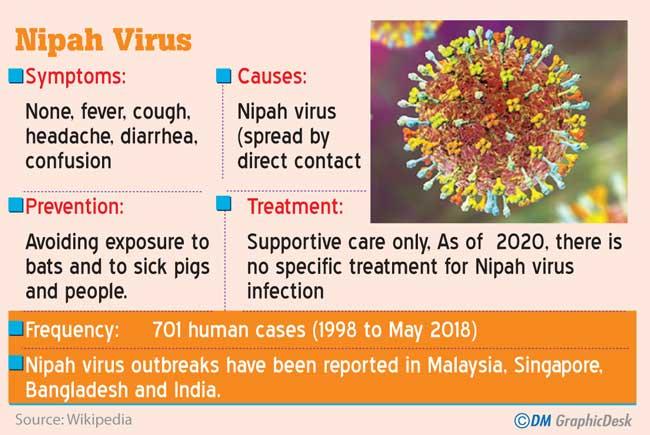27 Sep 2023 - {{hitsCtrl.values.hits}}

 “Humans and other animals can get infected by the virus either by direct contact with these bodily fluids released by bats or consuming food and drinks contaminated by them; for example, partially eaten fruits”
“Humans and other animals can get infected by the virus either by direct contact with these bodily fluids released by bats or consuming food and drinks contaminated by them; for example, partially eaten fruits”
Dr. Saranga Sumathipala
Consultant
 A press conference was held on September 22 to spread awareness of the Nipah virus. Dr. Saranga Sumathipala, a consultant virologist at Apeksha Hospital and Dr. Vinya Ariyaratne, the President of the Sri Lanka Medical Association, discussed the Nipah Virus focusing on the main question ‘Is Nipah virus a threat to Sri Lanka’.
A press conference was held on September 22 to spread awareness of the Nipah virus. Dr. Saranga Sumathipala, a consultant virologist at Apeksha Hospital and Dr. Vinya Ariyaratne, the President of the Sri Lanka Medical Association, discussed the Nipah Virus focusing on the main question ‘Is Nipah virus a threat to Sri Lanka’.
‘Nipah’ is a virus structurally similar to Measles and Mumps. The natural reservoir of the virus is known to be several bat species. “Nipah virus-infected bats shed the virus in their saliva, urine and faeces. Humans and other animals can get infected by the virus either by direct contact with these bodily fluids released by bats or consuming food and drinks contaminated by them; for example, partially eaten fruits,” stated Dr. Sumathipala.
Nipah virus is a zoonotic virus that can cause severe and often fatal encephalitis (swelling of the brain) in humans. Humans can get the infection via an intermediate animal host which first acquires it from bats. According to these medical experts infection with Nipah virus can cause mild to severe disease including encephalitis and potentially death. Symptoms typically appear in 4 – 14 days following exposure to the virus. The illness initially presents as 3 – 14 days of fever and headache and often includes signs of respiratory illness such as cough, sore throat and a difficulty in breathing.
There were further discussions on the current outbreak of the infection and risks to Sri Lanka and it was said that there is no definite antiviral treatment options or vaccines available to treat patients. The best way to prevent the Nipah virus infection is to avoid contact with infected bats and avoid eating fruits that have been bitten into.
In recent years, the Nipah virus has caused repeated outbreaks in Kerala, India. The latest outbreak has been present since August 2023 with six cases and two fatalities till to date. This outbreak is contained in a limited region and there are no reported cases beyond this perimetre in India or any other country. The Nipah virus has never been reported in Sri Lanka and the country remains at a low risk category with regard to the virus infection as discussed during the press conference.
26 Dec 2024 44 minute ago
26 Dec 2024 2 hours ago
26 Dec 2024 3 hours ago
26 Dec 2024 3 hours ago
26 Dec 2024 4 hours ago